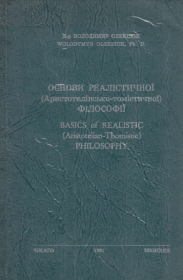Basics of Realistic (Aristotelian-Thomistic) Philosophy: Munich, «Logos», 1981, 280 с.
Keywords:
Classical metaphysics, science, higher being, first causeSynopsis
The aim of the book is to present and advocate realistic metaphysics in the form of Thomistic philosophy. The reason for this is that, according to the author, there is no established Ukrainian philosophical tradition. According to Oleksiuk, the Christian realist metaphysics proposed in the book could become the basis for the development of such a modern Ukrainian philosophy. The work provides a systematic account of the key themes of realist metaphysics, as well as elements of its comparison with alternative approaches.
Contents
Introduction
Preface
PART I
Prologue - What is philosophy and what is its meaning
Logic - Aristotelian logic
Formal logic - Receptivity
Judgement
Reasoning
PART II
Material logic
Universal
Assertions (Predicates)
Categories
Genus of difference
First principles
Demonstration
Science
The nature of logic
PART III
Philosophy of nature
Matter and form
Nature
Motion
Place and time
The first unmoved mover
PART IV
Philosophy of psychology
Life and spirit
Cognition
Sensation and cognition
Intelligence
Appetite
Conceptual aspects
Willpower
The human being
PART V
Metaphysics
Being
Transcendentalism
Principles of being
Substance and means of existence
Causality
Wisdom
PART VI
Epistemology
Knowledge
Truth and falsity
Proof and certainty
PART VII
Natural theology (theodicy)
Participation in the action of being
Proof of the existence of God
PART VIII
Five ways to prove the existence of God
А. Is God's existence self-evident?
- Other views
- The possibility of demonstrating God's existence
- Proof of God's existence
- The first way: Demonstration from the motion
- The second way: Demonstration from the productive cause
St Thomas' argument
- The third way: Demonstration from the contingent things
- Demonstration from the degree of perfection of the universe
St Thomas' argument
- The fifth way: Demonstration from the order of the universe
З. Conclusions
PART IX
The essence and attributes of God
Real attributes
Operative attributes
Divine causality
The problem of evil
PART X
Ethics (Philosophy of morality)
Human action
The end of human action
Voluntariness and involuntariness
Morality and responsibility
Law and just reason
PART XI
Philosophy of the humanities. Philosophy of language
Philosophy of art
Philosophy of history
Philosophy of religion
Philosophy of education
Philosophy of value
PART XII
Epilogue (The problem of understanding views - East)
The West
19th century
20th century
Index
Bibliography
Downloads




